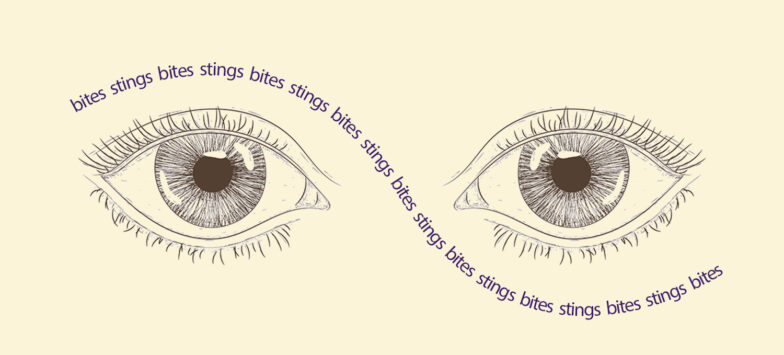
Bites & Stings Around the Eye – Bee Careful!
Bees and wasps are with us outdoors as we enjoy the summer weather, and most of the time, these busy little pollinators don’t sting us. It’s even less likely to be stung near or in the eye, but it’s helpful to know what to do if that should happen.
AROUND is different from IN
A sting to the face near the eye can be especially painful and a little alarming, but it’s usually not dangerous. Unless you are allergic to bee venom, a bee sting is a minor injury that can usually be treated at home. But if you get stung on the eyelid or the eyeball itself (cornea), you should seek attention right away from your Atlantic Eye ophthalmologist, or go to the emergency room.
The bee stinger contains toxins that can cause inflammation. Stingers are also sharp, with a saw-like structure that makes them difficult to remove completely. So what to do if you get stung around the eye?
Remove the stinger as soon as possible:
If it is safe to do so, you can try to take out the stinger with a pair of tweezers, brush it out with your fingers or use the edge of a credit card to scrape the stinger out of the skin. If you are unable to do this, get help from someone.
Relieve the swelling and pain:
You can reduce swelling using a cold compress for about ten minutes at a time, for as long as the swelling lasts. A paste of baking soda and water dabbed on the sting site may also help. Take an astihistimine to relieve itching, and ibuprofen to reduce discomfort and swelling.
Keep the site clean:
To help remove dirt and bacteria, wash the site of the sting with mild soap and warm water. You might also use a small amount of disinfecting ointment to help prevent infection and speed healing.
See a doctor if:
• you have any kind of severe allergic reaction, such as hives or difficulty breathing. Seek emergency medical attention.
• you notice changes to your vision after the swelling starts to go down. See your ophthalmologist.
• you think part of the stinger might be embedded in the tissue around your eye. See your ophthalmologist.
• you have been stung on the eyelid or eyeball itself. Contact your ophthalmologist immediately, or go to the emergency room.
Your Atlantic Eye Ophthalmologists hope nobody’s eyes get anywhere near the business end of a stinging insect this summer. But if a non-emergency sting does occur, know that we are always a phone call or text message away at our four Monmouth County offices. It’s always best to check with us before you attempt to treat any injury to the eye or eye area.
